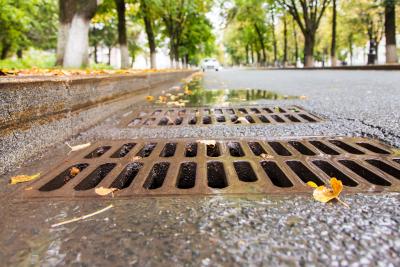Stormwater
The Stormwater Division is charged with managing the City's stormwater program. Responsibilities include reviewing and issuance of stormwater permits for development, design, and construction of drainage, and compliance with the city’s NPDES permit requirements which includes city-wide monitoring of stormwater ponds and erosion control of all construction sites.
Stormwater Pollution
Do not wash debris or pollution down the storm drains. This can contribute to blockages that increase the chance of flooding as well as releasing damaging chemicals and organic material into our lakes.
Do not alter the normal function of stormwater system elements. Stormwater is designed to flow a certain way, so changes to the flow of water in one place can adversely affect another area.
Keep roadside ditches free of debris at all times. A simple blockage to a drainage system could also cause localized flooding.
Nutrient Pollution
Nutrient pollution is one of America's most widespread, costly, and challenging environmental problems, and is caused by excess nitrogen and phosphorus in the air and water. Nitrogen and phosphorus are nutrients that are natural parts of aquatic ecosystems. But when too much nitrogen and phosphorus enter the environment - usually from a wide range of human activities - the air and water can become polluted. Nutrient pollution has impacted many streams, rivers, lakes, bays, and coastal waters for the past several decades, resulting in serious environmental and human health issues, and impacting the economy. Please view below some helpful solutions on what you can do to prevent pollution at home.
- Never dump anything in a storm drain or into a drainage ditch.
- Throw litter in its proper place. If you see garbage near a storm drain, pick it up.
- Clean up after your pet. Pet waste is a significant source of pathogens.
- Motor oil is banned from landfill disposal and cannot be placed with your garbage. Recycle used motor oil and other automotive fluids at the oil recycling "igloos" at most Seminole County fire stations. You may also take used motor oil to the Seminole County Central Transfer Station.
- Never pour household hazardous wastes into storm drains, down the sink, or on the ground. Household Hazardous Waste is accepted FREE OF CHARGE at the Seminole County Central Transfer Station.
- Do not put greasy food items down the drain or garbage disposal. Wipe dishes, pots and pans with a paper towel to remove excess grease before washing.
- Maintain septic systems regularly.
- Regularly check your vehicles for leaks (and repair them).
- Compost yard wastes. Use compost grass, leaves and shrub clippings as mulch to supplement fertilizers. Do not blow or rake these materials into roadways or swales.
- Use fertilizers and pesticides only when other methods fail, and always follow the label instructions. Do not apply them when rain is in the forecast.
- Wash your vehicle at a commercial car wash, where all wastewater flows into the sanitary sewer system for treatment. If you choose to wash your car at home, please view the EPA’s Washing Your Car tips.
- Report illegal dumping immediately.
Pollutants entering the drains will be carried untreated into a local waterbodies!
Auto care
Washing your car and degreasing auto parts at home can send detergents and other contaminants through the storm sewer system. Dumping automotive fluids into storm drains has the same result as dumping the materials directly into a waterbody.
- Use a commercial car wash that treats or recycles its wastewater or wash your car on your yard so the water infiltrates into the ground.
- Repair leaks and dispose of used auto fluids and batteries at designated drop-off or recycling locations.
Lawn care
Excess fertilizers and pesticides applied to lawns and gardens wash off and pollute streams. In addition, yard clippings and leaves can wash into storm drains and contribute nutrients and organic matter to streams.
- Don’t overwater your lawn. Consider using a soaker hose instead of a sprinkler.
- Use pesticides and fertilizers sparingly. When use is necessary, use these chemicals in the recommended amounts. Use organic mulch or safer pest control methods whenever possible.
- Compost or mulch yard waste. Do not leave it in the street or sweep it into storm drains or streams.
Septic Systems
Leaking and poorly maintained septic systems release nutrients and pathogens (bacteria and viruses) that can be picked up by stormwater and discharged into nearby waterbodies. Pathogens can cause public health problems and environmental concerns.
- Inspect your system every 3 years and pump your tank as necessary (every 3 to 5 years).
- Don't dispose of household hazardous waste in sinks or toilets.
Pet Waste
Pet waste can be a major source of bacteria and excess nutrients in local waters.
- When walking your pet, remember to pick up the waste and dispose of it properly. Flushing pet waste is the best disposal method. Leaving pet waste on the ground increases public health risks by allowing harmful bacteria and nutrients to wash into the storm drain and eventually into local waterbodies.

